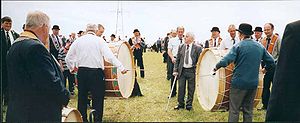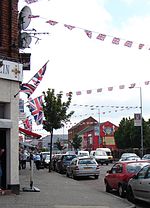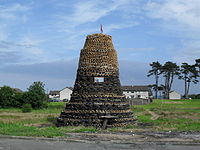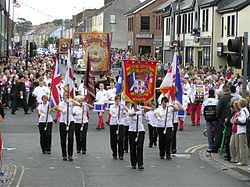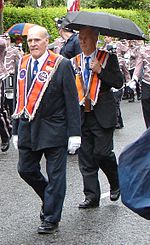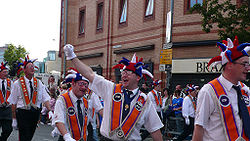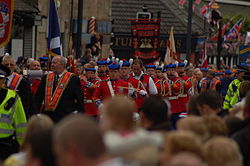- The Twelfth
-
The Twelfth 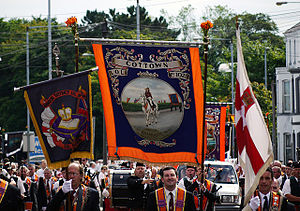
Orangemen parade in Bangor on 12 July 2010Also called Orangemen's Day,
OrangefestObserved by Orange Order Significance celebration of the Glorious Revolution (1688) and victory of William of Orange at the Battle of the Boyne (1690) Date 12 July Celebrations parading, Lambeg drumming contests, erecting flags and bunting Related to The Eleventh Night The Twelfth (also called Orangemen's Day[1] or, in Belfast, Orangefest) is a yearly Protestant celebration held on 12 July. It originated in Ireland during the 18th century. It celebrates the Glorious Revolution (1688) and victory of Protestant king William of Orange over Catholic king James II at the Battle of the Boyne (1690). It is sometimes called the Glorious Twelfth, but that term is more commonly used to refer to 12 August. Members of the Orange Order and Protestant marching bands stage parades throughout Northern Ireland and to a lesser extent in other parts of the world. The Toronto Twelfth, for example, is North America's oldest consecutive yearly parade.[citation needed] While it is a Protestant celebration, not all Irish Protestants celebrate it, whether due to political or cultural reasons or indifference. More recently, attempts have been made to play down the explicitly unionist political aspects of the parades (as well as any violent history) and present the Twelfth as a "cultural" event, at which tourists are welcome. It has been argued by some that before the Troubles, members of both communities participated in the event;[2] however it was dominated by Protestants and many Catholics opposed the celebrations.[3]
Contents
History
Orangemen commemorated several events from the 17th century onwards, celebrating the survival and triumph of their community in the face of the Irish Rebellion of 1641 and the Williamite war in Ireland (1689–91). The first such commemoration was the anniversary of the 1641 rebellion on 23 October, an attempted coup d'état by Irish Catholic gentry who tried to seize control of the English administration in Ireland. The second major day was the birthday of William of Orange, Protestant victor of the Williamite war in the 1690s on 4 November. Both of these anniversaries faded in popularity by the end of the 18th century.
The Twelfth itself originated as a celebration of the Battle of Aughrim, which took place on 12 July 1691 in the Julian calendar. Aughrim was the decisive battle of the Williamite war, in which the predominantly Irish Catholic Jacobite army was destroyed and the remainder capitulated at Limerick, thereafter being exiled to France to fight in the wars of Louis XIV, the Sun King. The Twelfth in the early 18th century was a popular commemoration of this battle, featuring bonfires and parades. The Battle of the Boyne (fought on 1 July 1690) was commemorated with smaller parades on 1 July. However, two events were combined in the late 18th century to switch the Twelfth commemorations to the Boyne.[4]
The first reason for this was the British switch to the Gregorian calendar in 1752, which repositioned the Battle of the Boyne to 11 July in the new calendar, the very eve of the Battle of Aughrim, on 12 July in the old calendar. The second reason was the foundation of the Orange Order in 1795. The Order preferred the Boyne, due to William of Orange's presence there. It has also been suggested that in the 1790s (a time of Roman Catholic resurgence) the Boyne, where the Jacobites were routed, was more appealing to the Order than Aughrim, where they had fought hard and died in great numbers.[5]
The Twelfth parades of the early 19th century often led to riots and public disorder, so much so that the Orange Order and the Twelfth were suppressed in the 1830s and 40s.
Events
Lead-up to the Twelfth
The 'marching season' begins around Easter, and from this point until the Twelfth the Orange Order stages numerous small parades. The most common of these are lodge parades, in which one lodge walks with a single band. Others, such as the 'mini-Twelfth' at the start of July, feature several lodges.
At the start of July, some unionist areas will be decorated in a 'loyal' style. In most such areas this will include the flying of flags (primarily the Union Jack and Ulster Banner but also the Flag of Scotland) from lamp posts and houses, and sometimes the erection of bunting over the streets. In especially Loyalist areas such as the Shankill Road and Sandy Row in Belfast many householders will also decorate their houses with large quantities of bunting and flags, murals will be touched up, small banners will be attached to lamp posts, and arches will be erected. Arches - which can range from elaborate wooden constructions costing thousands of pounds to a couple of ropes with flags hanging on them - are less common now than in former decades. Decorations generally remain in place until the end of August.
Eleventh night
Main article: Eleventh nightThe night before the Twelfth sees enormous bonfires lit in many Protestant, Unionist and Loyalist districts of Northern Ireland. These are alternately seen as friendly community get-togethers, depending on time, place and personal viewpoint. A recent criticism of the bonfires is that much of what is burnt (especially tyres) causes serious environmental pollution. In the past the fires were lit on intersections but damage to nearby houses and to the street itself meant that most areas now have an area of waste ground set aside for this purpose.
Official events
The main official way in which the Twelfth is celebrated in Northern Ireland is through parades, which are held all over Northern Ireland. Within Northern Ireland each District Lodge usually organises its own parade. In rural districts the parade will rotate around various towns, sometimes favouring those in which there is less likely to be trouble but in other years choosing those in which it is felt the 'right to march' needs to be defended. The Belfast parade takes more or less the same route, although in the 1980s the destination changed when the Order purchased a new field to end the parade in. In most areas the parade begins at an Orange Hall and proceeds through the town to a field where members of the Order, their friends and family, and the general public gather to eat, drink and listen to speeches by clergymen, politicians and senior members of the Order. In the past the Twelfth has been a major venue for discussion of the political issues of the day. A church service will also be conducted and sometimes band prizes will be awarded.
Lodges march together, and will generally alternate with marching bands of various kinds. Band members are often not formally associated with the Order but are hired for the day, although most are clearly of a similar political hue to the lodges, and have similar names. The bands, especially flute bands, have a reputation as being less respectable than the lodges, although they are seen by many as serving the useful purpose of keeping young men from working class areas out of trouble. An instrument almost unique to these marches is the Lambeg drum. The fact that no bands have vocalists, several different songs have the same tune, and successive bands will often be playing different songs can make it difficult even for locals and impossible for outsiders to know exactly what is being played. Popular songs include The Sash and Derry's Walls. Explicitly violent songs such as Billy Boys may also be played.
The vast majority of marchers are male, but there are some all-female bands and a few mixed bands. Some all-male bands have female flag or banner carriers. In addition, some Women's Orange Lodges take part in the parades. Orangewomen have paraded on the Twelfth in some rural areas since at least the mid-twentieth century, but were banned from the Belfast parades until the 1990s.
Orangemen on parade typically wear a dark suit, orange sash, white gloves and a bowler hat, although in recent years the hat has become less compulsory. An umbrella is often carried, although more because of the Northern Irish weather than for any ceremonial reasons. In the rare years of hot weather, many lodges will parade in shirt sleeves due to the distance covered. Orangewomen have not developed a standard dress code, but usually dress formally. Bands wear uniforms of various kinds, often colourful. Lodges usually carry elaborate banners depicting Orange heroes or historic or Biblical scenes, or Unionist symbols. The most popular subject is William III, often crossing the River Boyne.
At the field, some lodges and bands acquire humorous costumes or accessories and make the return journey in them, and the atmosphere is generally more relaxed and playful, although in times of tension it can also be more aggressive.
Unofficial events
12 July is an annual public holiday in Northern Ireland, and as a result many people from both communities take the opportunity to go on holiday outside Northern Ireland. This is often described as escape from the Twelfth and while this is certainly the case for some, others are simply doing what many people do in summer public holidays, and getting away from home.
During The Troubles some nationalist areas organised alternative festivals in order to keep Catholic children away from the parades, where they might come into conflict with Protestant children, and to make the holiday more enjoyable for their communities. It is often said that before the Troubles many Catholics watched the parades, although the numbers may be exaggerated.
The "marching season", as the parades are usually referred to by the press, and especially the Twelfth, has historically seen a rise in sectarian violence. Before the outbreak of the Troubles there were frequent conflicts over the displaying of Union Jacks and other flags, particularly in factories and other workplaces.
Controversy
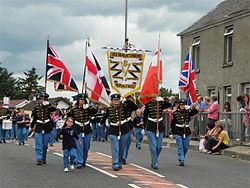 The Red Hand Defenders flute band parading with the Orange Order in Newtownstewart on 12 July 2010. The flags being carried are the Union Flag, the Ulster Banner and the Boyne Standard
The Red Hand Defenders flute band parading with the Orange Order in Newtownstewart on 12 July 2010. The flags being carried are the Union Flag, the Ulster Banner and the Boyne Standard
Parades on the Twelfth are often controversial due to the nature of the Orange Order, and the Twelfth is a tense occasion in many parts of Northern Ireland and County Donegal, with riot police on duty at flashpoint parades to prevent clashes between the nationalist community and unionist community. Many in the nationalist community view the parades as triumphalist and a sign of Unionist Protestant dominance in Northern Ireland. Marchers insist that they have the right to walk on public streets, particularly along their 'traditional routes', even if these routes take them through or past what are predominantly nationalist areas.[6][7] Nationalists see this as a deliberate territorial affront. Until 2010 the number of these flashpoints appeared to decrease, as the paraders were told to desist, or moderate them by the Parades Commission, and nationalists adopted a more relaxed attitude.
Every Twelfth between 1970 and 2005, British Army soldiers were deployed in Belfast to help police the parades. In 2006, for the first time in more than three decades, soldiers were not deployed on the streets of Belfast during the Twelfth, in what was seen as a benefit of the reduced tensions under the peace process.[8] Due to improved policing and the Northern Ireland peace process, recent parades have been more peaceful. Any complaints about parades may be referred to the Parades Commission, who can set restrictions or even ban a parade if it is seen to be too contentious.
The Twelfth outside Northern Ireland
Although the Twelfth is primarily observed in Northern Ireland, it is also commemorated in other countries with strong links to Ulster or a history of settlement by Irish Protestants. In Great Britain, Orange marches have died out recently and if they still exist they tend to be held a week or so before the Twelfth due to the number of bands and lodges that travel to Northern Ireland to march there. The Liverpool lodges parade both in the city and in the seaside resort of Southport on the 12th July. In Canada, the USA and Australia, marching occurs on the Twelfth, although this is much less common now than in former decades. However, 'Orangeman's Day' is a paid government holiday in the Canadian province of Newfoundland and Labrador.[9] Parades were formerly held in New Zealand on the Twelfth, but this no longer occurs.[10]
Until the Partition of Ireland, the Twelfth was observed by Protestants in many parts of Ireland, but the decline of the Protestant population and local antagonism have dramatically reduced the number held in the Republic of Ireland. The only remaining annual parade is held in Rossnowlagh and was on the Twelfth until the 1970s, when it was moved to the weekend before.[11]
In July 2010, former Tánaiste Michael McDowell said that the Twelfth should be made a national holiday in the Republic of Ireland as well as in Northern Ireland.[12]
See also
References
- ^ Bank holidays NI Direct
- ^ Dillon, Martin; Lehane, Denis (1973). "The truce is over but the assassinations continue: 10 July-31 August" (Paperback). Political Murder in Northern Ireland. Middlesex, UK: Penguin Books. p. 92. ISBN 0-14052-308-1.
- ^ Agnes Irene Caldwell, ‘Rising from Our Knees: Nationalist Response to Loyal Order Parades in Portadown, 1945-1993’, (PhD dissertation), Wayne State University, Detroit, 2004
- ^ Padraig Lenihan, The Battle of the Boyne, Tempus, 2003, ISBN 0752425978 p258-259
- ^ Padraig Lenihan, 1690 Battle of the Boyne, page 258-260)
- ^ Cracks in the Orange Order BBC News, 15 July 2008
- ^ Loyalist parade sparks riots in Catholic area The Guardian, 13 July 2004
- ^ Soldiers in barracks for Twelfth BBC News, 12 July 2006
- ^ Government Holidays for 2007 - Human Resources Policy Manual[dead link] Government of Newfoundland and Labrador
- ^ Ruth Dudley Edwards, The Faithful Tribe: An Intimate Portrait of the Loyal Institutions, London, 2000, p.136
- ^ Ó Cuív grants €250,000 to promote Orange Order Irish Times, 5 February 2008
- ^ Twelfth 'should be a national holiday' in the South BBC News, 22 July 2010
External links
- The Twelfth in pictures BBC News, 12 July 2006
- Gallery Orange Chronicle
- North Belfast parade passes peacefully RTÉ News, 12 July 2006
Categories:- Festivals in Northern Ireland
- July observances
- Orange Order
- Parades
- Protestantism
- Summer traditions
Wikimedia Foundation. 2010.

